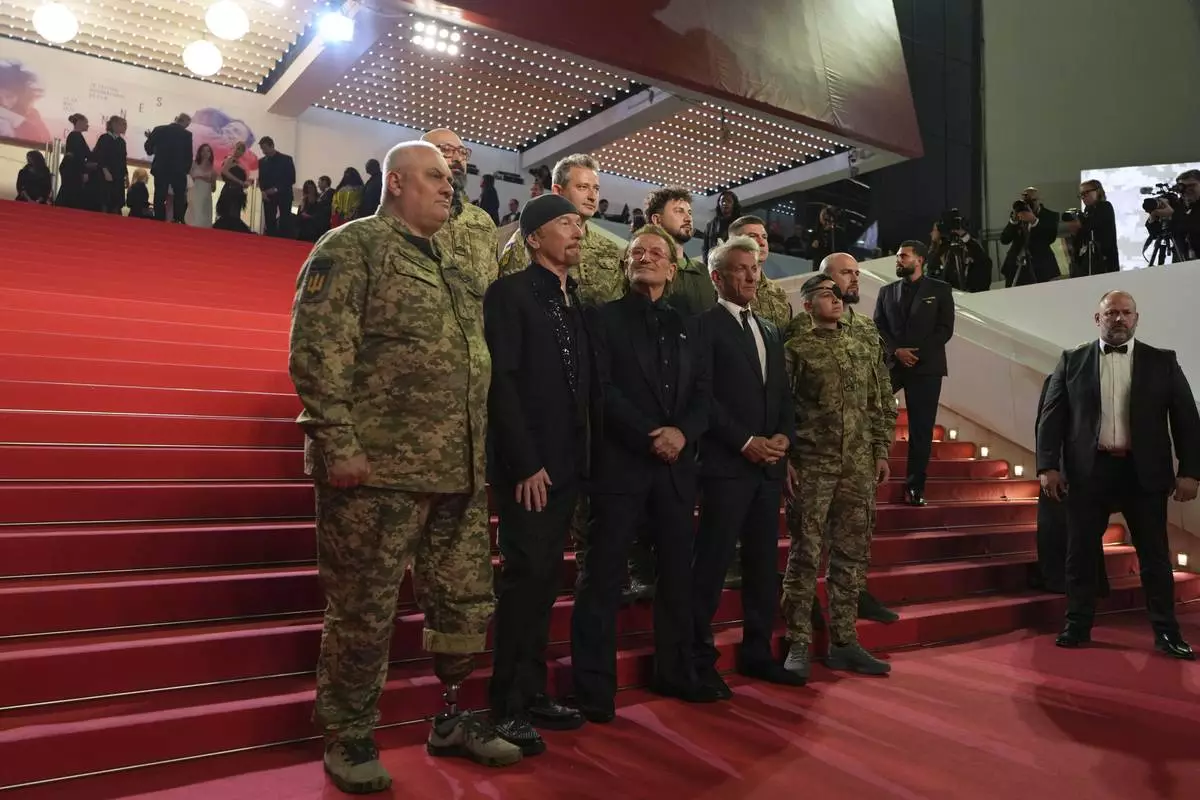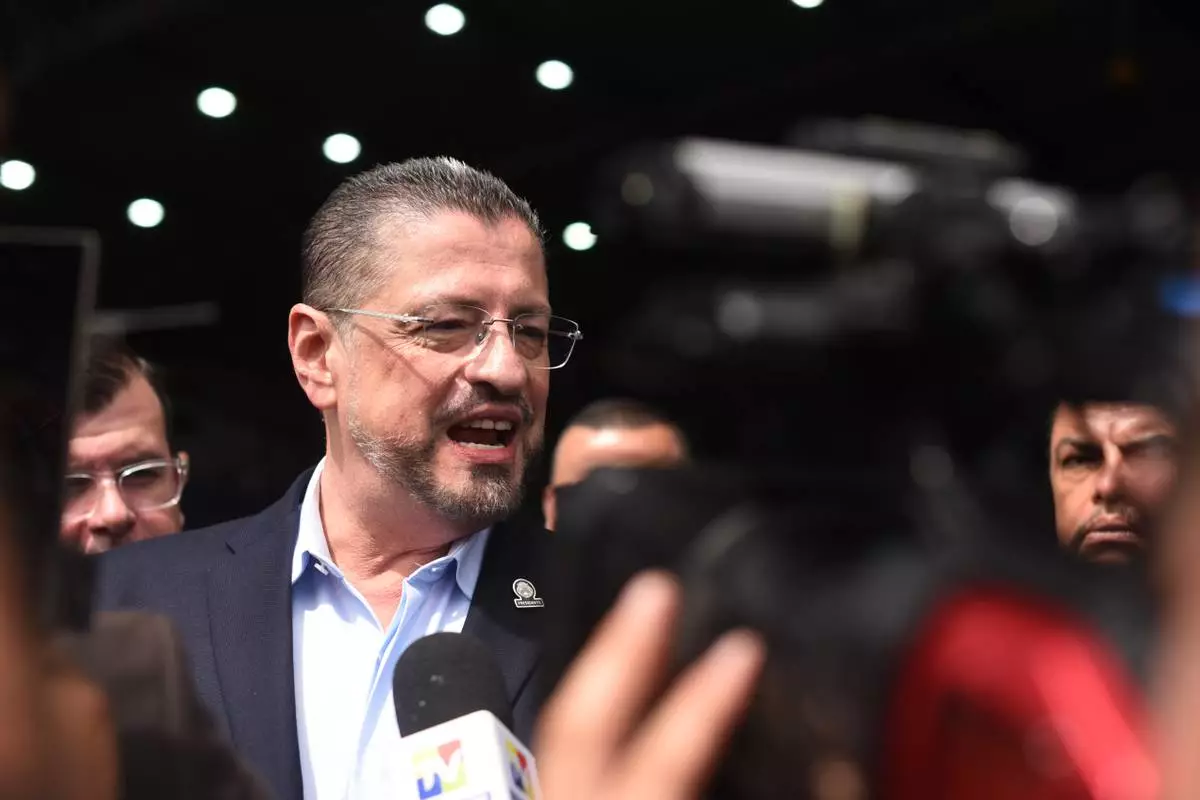CANNES, France (AP) — Cannes is a short trip from Bono’s seaside villa in Eze-sur-Mer. He bought it with The Edge in 1993, and considers himself grateful to a coastline that, he says, gave him a “delayed adolescence.”
“I can tell you I’ve slept on beaches close to here,” Bono says with a grin. “I’ve woken up in the sun.”
But that doesn't mean the Cannes Film Festival is a particularly familiar experience for the U2 frontman. He’s here to premiere the Apple TV+ documentary “Bono: Stories of Surrender,” which captures his one-man stage show. Before coming, Bono’s daughter, the actor Eve Hewson, gave him some advice.
“She said: ‘Just get over yourself and bring it,’" Bono said in an interview on a hotel off the Croisette. "What do I have to bring? Bring yourself and your gratitude that you’re a musician and they’re allowing you into a festival that celebrates actors and storytellers of a different kind. I said, ‘OK, I’ll try to bring it.’”
Besides, Cannes, he notes, was founded amid World War II as an alternative to then-Mussolini controlled Venice Film Festival. It was, he says, “designed to find fascists.”
Shifts in geopolitical tectonics was much on Bono's mind. He has spent much of his activist life fighting for aid to Africa and combating HIV-AIDS. U.S. President Donald Trump's dismantling of USAID has reversed much of that.
“What’s irrational is taking pleasure in the defacement of these institutions of mercy,” Bono said.
“Bono: Stories of Surrender,” an Andrew Dominik-directed black-and-white film that begins streaming May 30, adapts the one-man stage show that, in turn, came from Bono's 2022 book, “Surrender: 40 Songs, One Story.”
In the film, Bono is self-effacing and reflective, sifting through the formative influence of his father, U2's skyrocketing to fame and considering how ego and social work might be related. He calls it “the tall tales of a short rock star.” And as was the case on a recent sunny afternoon in Cannes, Bono makes a captivating raconteur.
Remarks have been lightly edited for clarity.
BONO: Well, that’s right. Globalization did very well for the world’s poor. That and increased aid levels brought a billion people out of extreme poverty and halved childhood mortality — remarkable jumps for quality of life for human beings.
But it’s also fair to say certain communities really paid the price for that — here in Europe, in the United States. And I’m not sure those communities were credited enough for weathering storms that globalization brought. So I understand how we got to this place, but it doesn’t mean that it’s the right place to be in.
Nationalism is not what we need. We grew up in a very charged atmosphere in Ireland. It makes you suspicious of nationalism and those animal spirits that can be drummed up. This is me speaking about surrender, “Stories of Surrender,” at a time when the world has never been closer to a world war in my lifetime. At first I think it looks absurd, a bit ridiculous — now that has never stopped me in the past — but I think it’s OK to look ridiculous for these ideas. Like surrender, nonviolence, peace.
BONO: The new pope, he does look like a pope. That’s a good start. I just saw the other day his first piece and he was talking about stopping shouting, God might prefer whispers. I thought, “Oh, this could be interesting.” I’m more of a shouter myself. I come from punk rock. But I’m learning to turn that shout into a whisper in this film to get to an intimacy.
BONO: Well, the accuracy of the put-down — “You are a baritone who thinks he’s a tenor” — is so all encompassing. I was going to call the play “The Baritone Who Thinks He’s a Tenor.” He’s on my mind because he’s the reason I sing.
It’s a wound that will never close because after playing him on stage for all those nights — just by turning left or right — I always loved him but I started to really like him. He started to make me laugh. There was a gift, as well as the voice, that he left me. Would he forgive me for impersonating him in the Teatro di San Carlo, a sacred place for tenors, probably not. But here I am impersonating an actor, so.
BONO: Mission creep. I knew I had to write the book. The play was so I didn’t have to tour the book in normal promotional activity, that I could actually have fun with it and play all the different characters in my life. I thought it was really good fun. Then I realized: Oh, there’s parts of you that people don’t know about. We don’t go to U2 shows for belly laughs. But that’s a part of who I am, which is the mischief as well as the melancholy.
Then you end up doing a play with a lot of cameras in the way. Enter Andrew Dominik and he taught me something that I didn’t really understand but my daughter does: The camera really knows when you’re lying. So if want to tell this story, you better get ready to take your armor off. You’re going to feel naked in front of the whole school, but that’s what it takes.
BONO: Based on my behavior just in the past week, the answer to that question is probably: Must try harder. The pilgrim’s lack of progress. I would say that I understand a little better where I came from and that where I end up depends on how I deal with that.
I’ve been calling it the hall of mirrors, when you try to figure out who you are and who’s behind the face. Then you just see all these faces staring back at you, and they’re all true. The real star of this movie is my dad. I sort of like him better than I like myself because humor has become so important to me. It’s not like everything needs to be a belly laugh, but there’s a freedom. People like me, we can sing about freedom. It’s much better to be it.
BONO: There’s a minister from Albania who said something that really stuck with me. She said: If you have a chance to hope, it’s a moral duty because most people don’t. So, yes, I feel we’ll figure our way out of this. This is a scary moment.
I think acknowledging that we can lose all we’ve gained is sobering but it may be course-changing. I just believe in people enough. I believe in Americans enough. I’m an Irish person, I can’t tell people how to vote.
I can tell you that a million children dying because their life support systems were pulled out of the wall, with glee, that’s not the America that I recognize or understand. You’re on the front lines of Europe here. America came in and saved the day. Ironically, so did Russia. More people died from Russia fighting the Nazis than everybody else. Now they tread on their own sacred memories by treading on the Ukrainians who also died on the front lines. I think part of that is that history didn’t acknowledge it.
I believe there is integrity in the Russian people. They need to change their leader, in my view. I believe there is integrity in the Americans. They will figure it out. Who was it who said: If you give Americans the facts, they will eventually make the right choice. Right now, they’re not getting the facts. Think of it: a 70% decline in HIV-AIDS, Republican-led, Democratically followed though. The greatest health intervention in the history of medicine to fight HIV-AIDS has been thrown away. It was nearly there. To a space traveler, it’s like getting to Mars and going, “Nah, we’ll go back.” It’s bewildering to me.
For more coverage of the 2025 Cannes Film Festival, visit https://apnews.com/hub/cannes-film-festival.

The Edge, from second left, Bono and Sean Penn pose with military personnel for photographers upon arrival at the premiere of the film 'Bono: Stories of Surrender' at the 78th international film festival, Cannes, southern France, Friday, May 16, 2025. (AP Photo/Natacha Pisarenko)

The Edge, left, and Bono pose for photographers upon arrival at the premiere of the film 'Bono: Stories of Surrender' at the 78th international film festival, Cannes, southern France, Friday, May 16, 2025. (Photo by Joel C Ryan/Invision/AP)

Erik Messerschmid, from left, Bono, Kelly McNamara, and Jon Kamen pose for photographers upon arrival at the premiere of the film 'Bono: Stories of Surrender' at the 78th international film festival, Cannes, southern France, Friday, May 16, 2025. (AP Photo/Natacha Pisarenko)

Bono poses for photographers upon arrival at the premiere of the film 'Bono: Stories of Surrender' at the 78th international film festival, Cannes, southern France, Friday, May 16, 2025. (AP Photo/Natacha Pisarenko)

Bono poses for photographers upon arrival at the premiere of the film 'Bono: Stories of Surrender' at the 78th international film festival, Cannes, southern France, Friday, May 16, 2025. (Photo by Lewis Joly/Invision/AP)















